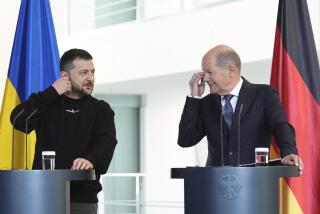German Woes Also Give Gorbachev a Headache
BERLIN — When Soviet President Mikhail S. Gorbachev last summer gave the green light for German unity, the deal looked good.
He not only wrested about $14 billion in financial assistance from Bonn but also won a valuable future friend. A powerful, united Germany might substantially expand its role as Moscow’s biggest Western trading partner. As the leading voice in an increasingly unified Western Europe, a friendly Germany could also promote Gorbachev’s reforms in such international forums as the European Community and the G-7 group of leading industrial nations.
Germany would be motivated by the realization that no foreign country stood to gain more from the success of these reforms--in terms of political stability and economic opportunity--than the Germans. But in recent months, a tide of events has seriously eroded Germany’s ability to help Moscow, a development that can only further weaken the beleaguered Soviet leader’s position. These include:
* Germany’s sudden isolation from her key allies during the crucial early days of the Persian Gulf War, and the resentment that came with Bonn’s lukewarm support for coalition forces fighting against Iraq, has diminished the country’s influence among important Western countries. And the perception that a united Germany would emerge as the de facto leader of an increasingly integrated Western Europe has not happened.
* The substantial underestimate of the difficulties in rebuilding the former East Germany is expected to reduce the level of German political energy and economic capital available to assist others, including the Soviets.
* Germany’s domestic climate has also changed. Television coverage, beamed into millions of German living rooms, showing Soviet tanks rolling over Lithuanian protesters in the streets of Vilnius last January has caused a deep, bitter disappointment among a people who only a month before had led a international relief effort, providing the Soviets with food and clothes.
Recent fact-finding tours of the Baltics by members of the German Parliament have heightened both public sympathy for the Baltics and intensified the suspicion that Gorbachev is gradually losing control of events in Moscow.
German public enthusiasm dropped a notch further when the Soviets flew former East German Communist leader Erich Honecker from Berlin to Moscow--ostensibly for emergency health treatment but more likely to help him escape manslaughter charges lodged against him by a German court. The Soviets have rejected German demands for his return.
But perhaps the most serious blow to Gorbachev’s reforms from Germany is the erosion of business confidence in his ability to succeed. A poll by the Allensbach Institute showed that nearly two-thirds of leading German managers believe that his reforms will fail; 2 1/2 years ago, 74% of top German managers believed he would succeed.
The result has been that new German investment and technical support considered crucial to the reform’s success have slowed to a crawl. Instead, German efforts now are focused on generating trade in the opposite direction.
More to Read
Sign up for Essential California
The most important California stories and recommendations in your inbox every morning.
You may occasionally receive promotional content from the Los Angeles Times.









